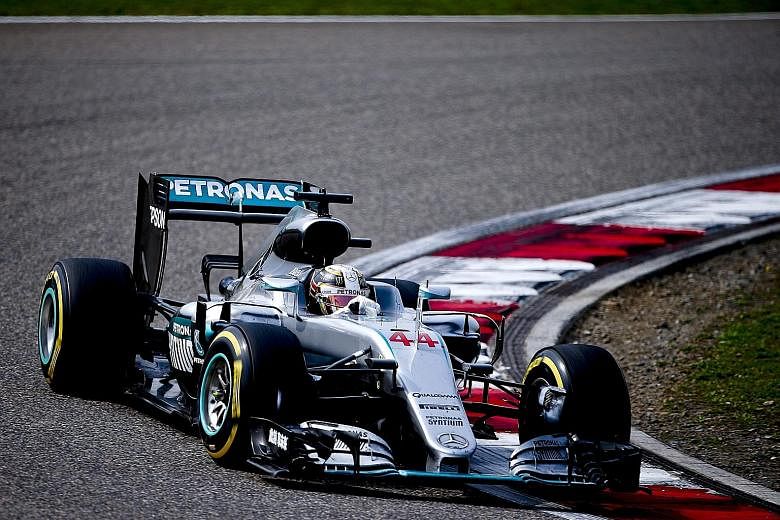Predictability is the biggest passion-killer in sport. It cannot help the hugely declining viewing figures for Formula One that, even when Lewis Hamilton fails to win the first three races in a season, the other Mercedes car, in the hands of Nico Rosberg, canters home.
There are obvious reasons why F1, the sport so expensive to put on that governments have to subsidise races, is apparently blowing a gasket.
One is the lack of competitive racing in the lead-up to this season. And while some critics point to a severe drop in free-to-air TV audiences, this has been balanced by a rise in pay-TV audiences.
A second factor is that Bernie Ecclestone controls where and when the races take place. He and his company made the business bigger than the sport. In addition to cars being 300kmh advertising billboards for multinational companies, the aggressive sellout to pay-per-view TV means one of three things.
Either petrolheads pay the ever-increasing subscriptions (just as fans do for English Premier League football); or they "stream" the races; or they break the habit of viewing.

The ringmaster Ecclestone will do business with anyone, and say almost anything to get his show on the road.
This week, at an advertising conference in London, Ecclestone gained a few headlines and angered more than a few women when he repeated an age-old opinion of his, that women wouldn't be taken seriously behind the wheel of an F1 car.
The octogenarian was swiftly put in his place by American stock car racer Leilani Munter. She called him "a sad, pathetic, sexist old man with prehistoric views on women".
Ecclestone probably upset as many males with his view that there should be more women running teams, like Sauber's Monisha Kaltenborn and Williams' Claire Williams. "They (women) are more competent," he opined."They don't have massive egos."
Not like Mr Ecclestone's ego, then?
Moving on, there is serious discussion about who drives the cars anyway. Is it the drivers, or is it the team engineers?
From the start of this season, F1 has reduced the feedback between driver and pits. This is not Ecclestone's order, but the International Automobile Federation's response to the fact that instructions given to drivers had reached intolerable levels.
The drivers themselves feel that the ever-increasing complexity of the technology and the engines makes it near-impossible for man (or presumably that more competent creature, woman) to know everything about the machinery, and about the safety under the bonnet.
"You cannot give us a spaceship and then not tell us things when we are there," was how the twice world champion Fernando Alonso put it.
Lewis Hamilton, who reigns as the three-time champion, gave another perspective when he was asked on CNN how much say the drivers have in how F1 is run.
"No say," he replied. "Ultimately sport - business - is money and power. We will say stuff, but ultimately it's those people who are sitting in their chair striking a pen, paying cheques, making money, that will be the ones.
"I'm not saying it's wrong. It's just like a corporate business - money is the power, money is the ruler. The people who own the sport make the decisions."
One might conclude that they own Hamilton as well.
He turned up for the interview in shredded designer jeans. But his grey top bore eight corporate logos: Petronas, UBS, Boss, Epson, Bose, Pirelli, Qualcomm and of course Mercedes."
Yet Hamilton, 31, is himself a brand. More than one PR image maker has worked with him, trying to make him into a celebrity who "transcends" sport, like a David Beckham or a Michael Jordan.
The mixed messages coming out of this emerged when Hamilton was asked how much he owes to his sport.
"I've been here for 10 years," he said. "Given my blood, sweat and tears for the sport. So I don't feel like I owe it anything.
"I actually probably promote the sport more than any other driver ever has. I'm at more events talking about Formula One than any driver ever has, probably all the other drivers put together and more."
He catalogued what went wrong with his Mercedes in the three races of this new season. Without mentioning Nico Rosberg by name, he concluded: "He's done a great job. I've not been there to really be in the fight with him. He's had pretty much a breeze for the last three races. Good luck to him, but he should enjoy it while it lasts because you never know how long it's going to last."
The champion, let down by his machine, is hurting. But for his image, he is trying not to show it.
Time was when champions who hit a bad run knuckled down and kept a relatively low profile while they worked with their support teams to turn the losing sequence around.
The flaw in Hamilton's self-promotional game is that he doesn't appear to see, or be coached to express, the obvious truth. If the three races this season have been such "a breeze" for Rosberg in the other Mercedes, does that tell us that maybe the three-year dominance of Hamilton has been a race between just two?
And, just maybe, the fall in interest reflects the fact that people around the world are no longer keen about paying to watch a two-car race. Mercedes are winning the technological contest, whichever driver in whichever car proves reliable to the end line.
That's F1, a "corporate business", as Hamilton calls it, where money is the ruler.


